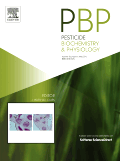
Pesticide Biochemistry and Physiology
Scope & Guideline
Transforming agricultural ecosystems with pioneering research in pesticide biochemistry.
Introduction
Aims and Scopes
- Pesticide Resistance Mechanisms:
Research on the genetic, biochemical, and physiological mechanisms through which organisms develop resistance to pesticides, including studies on mutations in target sites and metabolic resistance. - Biochemical Toxicology:
Investigations into the toxicological effects of pesticides on non-target organisms, including studies on cellular and molecular pathways affected by pesticide exposure. - Pesticide Efficacy and Mode of Action:
Studies that explore the effectiveness and mechanisms of action of various pesticides, including novel compounds and natural products. - Environmental Impact Studies:
Research focusing on the environmental consequences of pesticide use, including studies on soil, water, and non-target species. - Biocontrol and Integrated Pest Management (IPM):
Explorations of biological control agents and their interactions with pesticides, contributing to the development of integrated pest management strategies. - Molecular and Genomic Approaches:
Utilization of molecular biology techniques, including transcriptomics and proteomics, to understand pesticide interactions at the genetic and protein levels.
Trending and Emerging
- RNA Interference (RNAi) Applications:
There is a growing interest in RNAi technology for pest control, with studies focusing on the use of dsRNA for targeting specific genes in pest species to enhance control efficacy. - Natural Products and Biopesticides:
Research on the efficacy of natural products and biocontrol agents is on the rise, reflecting a trend towards sustainable pest management solutions. - Omics Technologies:
The use of transcriptomics, proteomics, and metabolomics to study pesticide effects and resistance mechanisms is increasingly popular, allowing for a deeper understanding of biochemical pathways. - Microbiome Interactions:
Emerging research is focusing on the interactions between pesticides and the microbiome of pests, highlighting the importance of microbial communities in pest resistance and pesticide efficacy. - Cross-Resistance and Fitness Costs:
Studies investigating the fitness costs associated with resistance mechanisms and how these affect pest populations are becoming more prominent, emphasizing the ecological implications of resistance. - Ecotoxicology and Non-Target Effects:
An increasing emphasis on the ecotoxicological impacts of pesticides on non-target organisms and ecosystems is evident, reflecting a broader environmental concern.
Declining or Waning
- Traditional Chemical Pesticides:
Research focusing exclusively on conventional chemical pesticides has been decreasing as the field shifts towards biopesticides and integrated pest management strategies. - Single-Specimen Studies:
There is a noticeable decline in studies that focus on a single organism without considering ecological interactions, as there is a growing emphasis on multi-species and ecosystem-level impacts. - Basic Toxicology Studies:
Basic studies on the toxic effects of pesticides without a focus on resistance mechanisms or ecological implications are becoming less common, reflecting a shift towards more applied research. - Laboratory-Only Experiments:
Research that solely relies on laboratory experiments without field validation is less frequent, as there is an increasing demand for studies that reflect real-world conditions.
Similar Journals
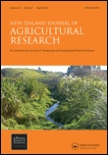
NEW ZEALAND JOURNAL OF AGRICULTURAL RESEARCH
Advancing Agricultural Science for a Sustainable FutureNEW ZEALAND JOURNAL OF AGRICULTURAL RESEARCH is a prestigious, peer-reviewed journal published by Taylor & Francis Ltd that has been at the forefront of agricultural science since its inception in 1958. With a strong focus on the fields of Agronomy and Crop Science, Animal Science and Zoology, Plant Science, and Soil Science, this journal has established itself in the academic community, achieving a notable Q2 ranking in various agricultural categories as of 2023. The journal thrives on its commitment to disseminating cutting-edge research and innovative practices that address contemporary challenges in agriculture. Although it does not currently offer an open access option, its valuable contributions can be accessed through various academic platforms, ensuring that vital research reaches a wide audience of researchers, professionals, and students globally. The journal's continued relevance and authority are reflected in its strong Scopus rankings, further emphasizing its role as a critical journal within the agricultural sciences.
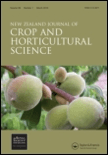
NEW ZEALAND JOURNAL OF CROP AND HORTICULTURAL SCIENCE
Advancing Agricultural Insights for a Sustainable FutureThe New Zealand Journal of Crop and Horticultural Science, published by Taylor & Francis Ltd, stands as a key resource in the fields of Agronomy and Horticulture, with a commendable impact factor reflecting its quality and influence in the scientific community. Since its inception in 1989, this journal has been committed to advancing our understanding of crop development and horticultural practices, catering not only to researchers and professionals but also to students eager to delve into the intricacies of plant sciences. With a Q3 ranking in both Agronomy and Crop Science and Horticulture as of 2023, the journal occupies a significant position within the agricultural and biological sciences domain, significantly contributing to the body of knowledge in these fields. The journal features original research, reviews, and technical notes that cover a wide range of topics, ensuring a comprehensive perspective on contemporary and emerging agricultural issues. For individuals interested in accessing cutting-edge research, the journal provides subscription-based access, further enhancing its scholarly contributions.

NEMATOLOGY
Exploring the Intricacies of NematodesNematology is a prominent journal published by BRILL, focusing exclusively on the multifaceted realm of nematodes and their ecological, agricultural, and biological implications. With an ISSN of 1388-5545, this esteemed journal serves as a vital platform for researchers, professionals, and students dedicated to advancing knowledge in Agronomy and Crop Science and Ecology, Evolution, Behavior, and Systematics. Established in 1999 and continuing its mission until 2024, Nematology holds a Q2 ranking in Agronomy and Crop Science and a Q3 ranking in Ecology as of 2023, indicating its significant impact within these fields. Published in the Netherlands, this journal is accessible through various options, providing vital insights into nematological research and its applications. Researchers from around the globe are encouraged to explore, submit manuscripts, and contribute to the evolving discourse within this specialized yet pivotal area of study.

JOURNAL OF PESTICIDE SCIENCE
Innovating solutions for agricultural and public health challenges.JOURNAL OF PESTICIDE SCIENCE, published by the PESTICIDE SCI SOC JAPAN, serves as a crucial conduit for scientific discourse in the fields of pesticide science, toxicology, and insect science. Since its inception in 1975 and now an Open Access journal since 2020, it aims to disseminate high-quality research findings, reviews, and innovative methods, directly supporting advancements in both agricultural sustainability and public health. With an ISSN of 1348-589X, the journal currently holds a Q3 ranking for Health, Toxicology and Mutagenesis, and a commendable Q2 rank in Insect Science—a testament to its relevance and impact within the scientific community. As of 2023, it is recognized in Scopus with notable rankings in various categories, emphasizing its significance among peers. The journal is headquartered at TOKYO UNIV AGR DEPT OF AGR CHEM, TOKYO, JAPAN, and remains committed to fostering collaboration and promoting vital research that addresses the challenges posed by pesticide use. Researchers, professionals, and students alike are encouraged to engage with this essential resource, contributing to the ongoing dialogue regarding pest management and environmental health.

Pesquisa Agropecuaria Tropical
Empowering innovation in agronomy and crop science.pesquisa Agropecuaria Tropical is a premier Open Access journal dedicated to advancing the knowledge and practices within the field of agronomy and crop science. Since its inception in 1971, this peer-reviewed journal, published by the Universidade Federal de Goiás, has played a pivotal role in disseminating high-quality research from Brazil and beyond. Operating under an Open Access model, it ensures that scholarly articles are freely accessible, thereby fostering greater collaboration and innovation. With a Scopus ranking placing it in the 32nd percentile among its peers in agricultural and biological sciences, and a current classification in the Q3 category of agronomy and crop science, the journal serves as an essential resource for researchers, professionals, and students alike. As it continues its publication journey from 2010 to 2024, it remains committed to contributing valuable insights and advancements in the agricultural sector, ultimately influencing sustainable practices and food security.
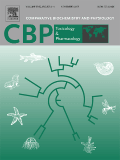
COMPARATIVE BIOCHEMISTRY AND PHYSIOLOGY C-TOXICOLOGY & PHARMACOLOGY
Unlocking the Secrets of Biochemical Processes Across SpeciesComparative Biochemistry and Physiology C-Toxicology & Pharmacology, published by Elsevier Science Inc, stands as a prominent resource in the fields of pharmacology, toxicology, and biochemical research. With its ISSN 1532-0456 and E-ISSN 1878-1659, this journal has carved out a significant niche, focusing on the comparative aspects of biochemical and physiological data across various species. Recognized for its impact in diverse fields, it boasts a Q1 ranking in Animal Science and Zoology, Aquatic Science, Health, Toxicology and Mutagenesis, alongside respectable standings in other related disciplines. Researchers and professionals can leverage this publication to access high-quality, peer-reviewed studies that advance the understanding of biochemical processes and their toxicological implications. The journal aims to bridge the gap between laboratory findings and real-world applications, fostering an environment for interdisciplinary collaboration. For academics seeking to enhance their knowledge or contribute to this impactful field, Comparative Biochemistry and Physiology C-Toxicology & Pharmacology serves as an invaluable platform.

SPANISH JOURNAL OF AGRICULTURAL RESEARCH
Unveiling Insights in Agricultural Practices and SustainabilityThe Spanish Journal of Agricultural Research (ISSN: 1695-971X, E-ISSN: 2171-9292), published by the prestigious Consejo Superior Investigaciones Cientificas (CSIC), serves as a vital resource for those engaged in the fields of agronomy and crop science. Established as an Open Access journal since 2003, it aims to foster the dissemination of innovative research and practical applications related to agricultural practices and sustainability. With its Q3 category in Agronomy and Crop Science and a Scopus ranking of #224 out of 406, the journal provides an accessible platform for scholars to share valuable findings that enhance agricultural productivity and environmental stewardship. Covering research from 2006 to 2024, this journal continues to be instrumental for researchers, professionals, and students eager to remain at the forefront of agricultural science advancements.

Egyptian Journal of Biological Pest Control
Leading the way in biological pest management research.The Egyptian Journal of Biological Pest Control, published by SPRINGER, is a premier open-access journal dedicated to advancing the field of biological pest management. With its ISSN 1110-1768 and E-ISSN 2536-9342, this journal has established a reputation for disseminating high-quality research since its inception in 2008. Its commitment to open access since 2018 enhances its accessibility, making vital research available to a global audience. The journal boasts impressive Scopus rankings, including a Q1 classification in Agronomy and Crop Science and Insect Science for 2023, demonstrating its significant influence in the realms of ecological and agricultural research. The journal serves as an essential platform for researchers, professionals, and students interested in sustainable pest control strategies, focusing on the integration of biological methods within conventional agricultural practices. Based in Egypt, it plays a crucial role in addressing both regional and global challenges in pest management, affirming its importance in the scientific community.

Agronomy-Basel
Cultivating Knowledge for Sustainable AgricultureAgronomy-Basel is a leading international journal dedicated to advancing the field of agronomy and crop science, published by the respected MDPI. Since its inception in 2011, this open-access journal has provided a vital platform for the dissemination of high-quality research, featuring innovative studies and reviews that contribute to the understanding of agricultural practices and crop management. With an impressive impact factor and ranked in the Q1 quartile of its category for 2023, Agronomy-Basel has established itself as a premier resource in the realm of Agricultural and Biological Sciences, achieving a commendable rank of #62 out of 406 in its field, placing it in the 84th percentile. The journal targets researchers, professionals, and students who are dedicated to enhancing agricultural sustainability and productivity. Located in Basel, Switzerland, the journal's commitment to open access empowers global accessibility to flourishing agricultural advancements, thus fostering collaboration and innovation across the globe.
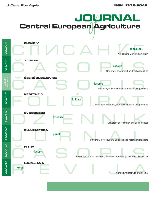
Journal of Central European Agriculture
Cultivating Insights in Crop and Animal SciencesThe Journal of Central European Agriculture, with ISSN 1332-9049 and E-ISSN 1332-9049, is an esteemed platform published by UNIV ZAGREB, FAC AGRICULTURE that caters to the dynamic fields of agronomy, crop science, and animal science. Since its establishment in 2000, this Open Access journal has played a crucial role in disseminating critical research findings while fostering collaboration among academics, researchers, and professionals within the agricultural community. The journal, which is based in the heart of Croatia, spans a rich history of scholarship, with its content available for free to readers and contributors alike. As reflected in its current standings, the journal has achieved a Quartile 3 ranking in Agronomy and Crop Science and Quartile 4 in Animal Science and Zoology for the year 2023, indicating its growing influence within these disciplines. With Scopus ranks placing it in the 32nd percentile among its peers, the Journal of Central European Agriculture is committed to advancing agricultural sciences not only in Central Europe but globally as it prepares for its converged years from 2007 through 2024. This journal serves as a vital resource for innovative research, practical applications, and a deeper understanding of agricultural challenges and solutions.